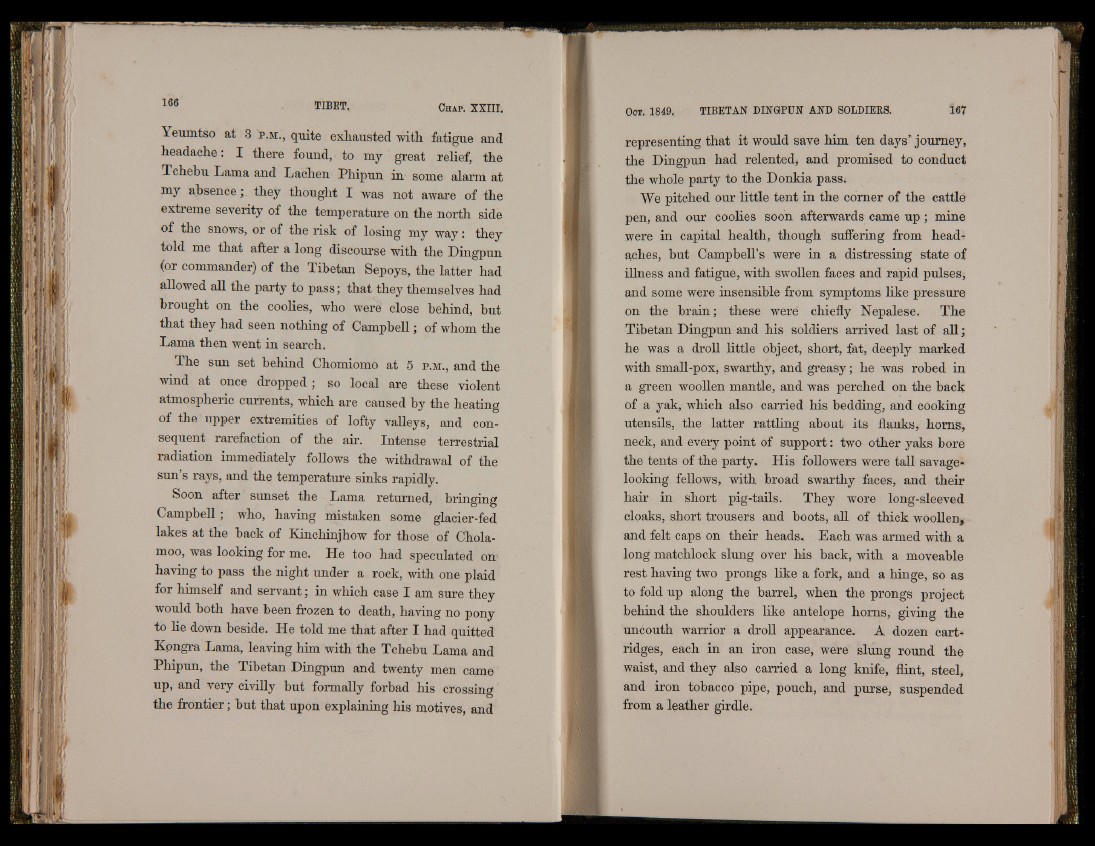
Yeumtso at 3 p .m ., quite exhausted with fatigue and
headache: I there found, to my great relief, the
Tchebu Lama and Lachen Phipun in some alarm at
my absence; they thought I was not aware of the
extreme severity of the temperature on the north side
of the snows, or of the risk of losing my way: they
told me that after a long discourse with the Dingpun
(or commander) of the Tibetan Sepoys, the latter had
allowed all the party to pass; that they themselves had
brought on the coolies, who were close behind, but
that they had seen nothing of Campbell; of whom the
Lama then went in search.
The sun set behind Chomiomo at 5 p .m ., and the
wind at once dropped ; so local are these violent
atmospheric currents, which are caused by the heating
of the upper extremities of lofty valleys, and consequent
rarefaction of the air. Intense terrestrial
radiation immediately follows the withdrawal of the
sun’s rays, and the temperature sinks rapidly.
Soon after sunset the Lama returned, bringing
Campbell; who, having mistaken some glacier-fed
lakes at the hack of Kinchinjhow for those of Chola-
moo, was looking for me. He too had speculated on
having to pass the night under a rock, with one plaid
for himself and servant; in which case I am sure they
would both have been frozen to death, having no pony
to lie down beside. He told me that after I had quitted
Kpngra Lama, leaving him with the Tchebu Lama and
Phipun, the Tibetan Dingpun and twenty men came
up, and very civilly hut formally forbad his crossing
the frontier; but that upon explaining his motives, and
representing that it would save him ten days’- journey,
the Dingpun had relented* and promised to conduct
the whole party to the Donkia pass.
We pitched our little tent in the corner of the cattle
pen, and our coolies soon afterwards came u p ; mine
were in capital health, though suffering from headaches,
but Campbell’s were in a distressing state of
illness and fatigue, with swollen faces and rapid pulses,
and some were insensible from symptoms like pressure
on the brain; these were chiefly Nepalese. The
Tibetan Dingpun and his soldiers arrived last of a ll;
he was a droll little object, short, fat, deeply marked
with small-pox, swarthy, and greasy; he was robed in
a green woollen mantle, and was perched on the back
of a yak, which also carried his bedding, and cooking
utensils, the latter rattling about its flanks, horns,
neck, and every point of support: two other yaks bore
the tents of the party. His followers were tall savage-
looking fellows, with broad swarthy faces, and their
hair in short pig-tails. They wore long-sleeved
cloaks, short trousers and boots, all of thick woollen*,
and felt caps on their heads. Each was armed with a
long matchlock slung over his back, with a moveable
rest having two prongs like a fork, and a hinge, so as
to fold up along the barrel, when the prongs project
behind the shoulders like antelope horns, giving the
uncouth warrior a droll appearance. A dozen cart*
ridges, each in an iron case, were slung round the
waist, and they also carried a long knife, flint, steel,
and iron tobacco pipe, pouch, and purse, suspended
from a leather girdle.